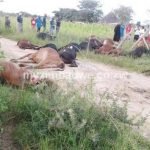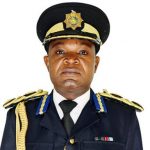Mutsawashe Mashandure
Herald Correspondent
There are many misconceptions about the dead in traditional African cultures, but these misconceptions do not accurately reflect the beliefs of all Africans.
Regardless of their specific beliefs, morticians play an important role in many African cultures.
Morticians not only care for the body of the deceased, but also provide emotional support to the family and community.
While they may not fear the dead, it is important to note that morticians in Africa take their job very seriously.
They understand the importance of properly preparing the body for burial, and respect the wishes of the family and community. It is also important to note that, while they do not fear the dead, they do take precautions to protect themselves from any potential danger.
For example, some morticians wear special protective clothing when handling the body, and they may also perform special rituals to cleanse themselves after their work is done.
A typical procedure for a mortician when preparing a body for burial would include:
Emptying the body of its internal organs and fluids, washing and disinfecting the body, applying a special powder to the body to help preserve it, dressing the body in special clothing or a shroud, preparing the body for burial by placing it in a coffin or other burial container, transporting the body to the burial site and lowering it into the grave.
It is important to note that this process may vary depending on the specific culture and beliefs of the family and community.
There are four main types of morticians, each with their own specific duties and responsibilities:
Embalmers these morticians are responsible for preserving and preparing the body for burial. They may use chemicals, cosmetics, and special equipment to ensure that the body is preserved and looks as natural as possible.
Funeral directors and morticians are responsible for arranging the funeral service and coordinating all of the details. They may also work with families to plan a memorial service or other special events to honour the deceased.
Cremation technicians are responsible for cremating the body. They use special equipment for the main purpose of embalming is to preserve the body and prevent decomposition.
Funeral directors, you could highlight the many important roles that they play in helping families through one of the most difficult times in their lives. Funeral directors are not only responsible for arranging the funeral service, but they also provide emotional support and guidance to the family.
Funeral directors are also often responsible for filing death certificates, contacting the Social Security Administration, and providing other legal assistance. In short, funeral directors do much more than just plan a funeral service – they are there to help families every step of the way.
Cremation technicians are responsible for preparing the body for cremation, which includes washing, dressing, and positioning the body in the cremation chamber.
They also ensure that all of the required permits and documents are in order before cremation takes place.
Additionally, cremation technicians are often responsible for operating the cremation equipment, monitoring the temperature and ensuring that the process is completed safely and respectfully.
Undertakers could highlight the important role they play in helping families through the difficult process of laying their loved ones to rest.
Undertakers are responsible for arranging the funeral service, burial, and memorial service. They also help families with all the paperwork and legal requirements, such as obtaining a death certificate and notifying the Social Security Administration.
In addition to these tasks, undertakers often provide support and comfort to grieving families.
One of the biggest challenges morticians face is dealing with death on a daily basis. While some people may find comfort in the process of laying a loved one to rest, others may find it to be emotionally challenging.
In addition, morticians often have to deal with difficult family dynamics and the stress of meeting deadlines.
They may also face ethical dilemmas, such as when a family member requests a certain type of funeral service that is not in line with the deceased’s wishes.
One potential challenge that morticians may face is when they are given money or other valuable items by the family of the deceased. This can create an ethical dilemma, as it may be seen as taking advantage of the family’s grief.
To avoid this, many morticians have policies in place that prohibit them from accepting gifts from families.
However, this can still be a challenging situation to navigate, as morticians want to be respectful of the family’s wishes while also staying true to their ethical code.
In the end, it’s up to each mortician to decide how to handle these types of situations.
Speaking in an interview with one of the mortician teacher Masimba Ziyenge at the Harare Institute of Public Health (HIPH), he shared his experience.
“The problem is that when we work with the funeral industry, our family and friends distance themselves from you; they assume that you are possessed by a demon.
There are also some temptations; there whereby the dead can have money in their pockets, but should have to remember our ethics and hand the money to the relative.
“At one point I found US$1 000 from the dead person, so it is hard to pass that temptation,” he said
“As a mortician, I enjoy my profession, and there are no hallucinations after work, but maybe to those who use some things to have luck, those once may be tortured by the dead person.
“I enjoy being a mortician, my salary is just amazing,” he said.
Undertaking is not seen as a desirable career and with the shortage of personnel, the Harare Institute of Public Health (HIPH) has introduced a programme to train morticians, and possibly debunk myths around preparing the dead for burial and arranging funerals.
Speaking in an interview recently, HIPH Principal Dr Amos Marume said the college is seeking to shed more light on the medical course to increase employment opportunities, and seeing a need for training programmes that can produce skilled morticians who are committed to providing high-quality service.
“As a regulated school of higher and tertiary education we decided to enrol students in this mortician course starting on February 13. By doing this course, you will definitely find a job.”
Dr Marume said the college is targeting mostly young people, to equip them with life sustaining skills.
“I encourage youth to join and study this course so that they will not spend time doing nothing and saying there are no jobs, yet this course needs more people and has many opportunities.
“We decided to put maturity science, which starts with NFC-level certificates, which can be done by someone who did Form 2. The national certificate requires one who has finished Form 4 and has five subjects. Thus, the programme aims to say that everyone deserves a dignified burial. It was always our culture to follow the procedure when dressing the dead.”




